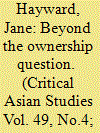|
|
|
Sort Order |
|
|
|
Items / Page
|
|
|
|
|
|
|
| Srl | Item |
| 1 |
ID:
155759


|
|
|
|
|
| Summary/Abstract |
A high-profile debate is taking place in China concerning the organization of agricultural land and production, with profound implications for China’s countryside. This debate is between those advocating for agricultural production to be taken over by large-scale agribusinesses, and those against this. Proponents regard agribusinesses as embodying modernity and progress, while those against forewarn of the channeling of profits out of peasant hands, the loss of peasants’ autonomy over labor and land, and the destruction of rural life. Recent English language publications on China’s agrarian change highlight the growing power of agribusiness and related processes of depeasantization, implying the Chinese debate on “who will till the land?” is futile. But this view obscures efforts by Chinese scholars and policymakers to promote forms of agricultural organization conducive to maintaining peasant livelihoods. By examining the Chinese debates on agribusinesses, family farms, and cooperatives, this article highlights points of contestation among policymakers and alternative possibilities, which may yet shape the course of China’s agrarian change. This article contributes to scholarship on China’s agrarian change, broader questions concerning depeasantization, and developmental possibilities under collective ownership.
|
|
|
|
|
|
|
|
|
|
|
|
|
|
|
|
| 2 |
ID:
158496


|
|
|
|
|
| Summary/Abstract |
China’s government is promoting new-type think tanks. These are often treated with scepticism by Western observers, due to their lack of independence from government and operation within a controlled intellectual environment. In this article, I heed recent calls by scholars to analyze think tanks, and how they develop, in their particular national political contexts. In China’s case, this is a powerful one-party state undergoing internationalization: usually understood as increased foreign exchanges, engagement with international institutions, and rising influence globally. In contrast, I view internationalization as the reorganizing of China’s state institutions and social structure in order to integrate with the global capitalist system. Through these processes, China’s policymaking community is converging with a powerful transnational class aligned with global capitalist interests. Think tanks are implicated in these processes, and are therefore involved in shaping capitalist class dynamics within China. This is a cause for concern and debate among policy makers, regarding “civil” think tanks in particular, which are non-governmental and privately funded. Drawing on interviews with Chinese think-tank scholars, and examining policy debates on the development of think tanks in Chinese academic and policy journals, I argue that the sphere of think tanks has become an important site of political contestation concerning China’s internationalization and the impact of class power on national policy making. Western observers, too often viewing independence as the key criterion for evaluating China’s think tanks, miss the significance of these debates. The relations between think tanks and government institutions must be understood in this political context.
|
|
|
|
|
|
|
|
|
|
|
|
|
|
|
|
|
|
|
|
|